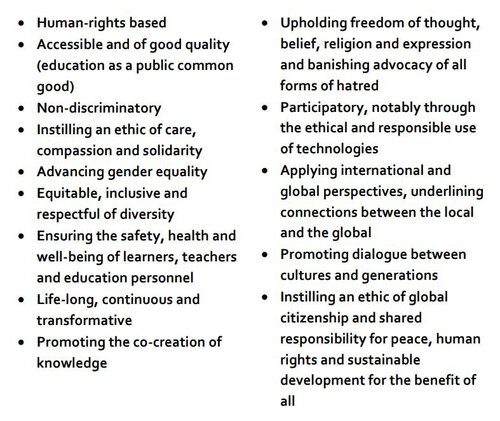- TOP
- 国際人権基準の動向
- FOCUS
- March 2024 - Volume Volume 115
- Human Rights Education in Asia-Pacific
FOCUS March 2024 Volume Volume 115
Human Rights Education in Asia-Pacific
One hundred ninety-four UNESCO member-states adopted the "Recommendation on Education for Peace, Human Rights and Sustainable Development" at UNESCO's General Conference on 20 November 2023. This 2023 Recommendation revised the 1974 "Recommendation concerning education for international understanding, co-operation and peace and education relating to human rights and fundamental freedoms."
UNESCO announced that the 2023 Recommendation, among other features,[1]
strongly emphasizes human rights and fundamental freedoms and integrates issues deemed central to achieving lasting peace in our era, such as sustainable development, climate change, respect for diversity, gender equality, and media and information literacy.
outlines 14 guiding principles, concrete learning outcomes and priority action areas for holistically reshaping all aspects of education systems, from laws and policies to curricula development, teaching practices, learning environments and assessment. For example, it highlights that beyond critical literacy and numeracy skills, learners should acquire competencies like empathy, critical thinking, intercultural understanding and environmental stewardship.
The fourteen guiding principles are summarized below:[2]
 On 19 March 2024, the National Human Rights Commission of Korea inaugurated its Human Rights Education Center. The Center is meant to "create a space for human rights education and culture that incorporates the values of human rights, to improve everyone's human rights awareness, to ensure the right to human rights education, and to effectively train human rights education professionals."
On 19 March 2024, the National Human Rights Commission of Korea inaugurated its Human Rights Education Center. The Center is meant to "create a space for human rights education and culture that incorporates the values of human rights, to improve everyone's human rights awareness, to ensure the right to human rights education, and to effectively train human rights education professionals."
The Center will be providing specialized training facilities on human rights education.
The need for national facilities in implementing international initiatives is embodied by the Human Rights Education Center of Korea. Training "human rights education professionals" is most effective when done at the national level and in support of United Nations programs and guides such as the UNESCO 2024 Recommendations.
Varied Initiatives[3]
The 13th volume of Human Rights Education in Asia-Pacific will be available on HURIGHTS OSAKA's website in April 2024. This volume is a collection of articles presenting initiatives on human rights promotion and education in different countries in the Asia-Pacific.
The articles discuss activities that range from campaigns to outreach programs, and from non-formal training to formal education courses. Different institutions/organizations are involved in these activities from a student organization to non-governmental organizations, from a special court to national human rights institutions.
On awareness-raising, the articles from Cambodia, Pacific islands and Taiwan present concrete ways of making the general public become aware and informed of human rights issues and concepts. The articles discuss study tours, museum visits, art competitions, rallies, and television and online media promotions. These activities have direct effect on people who participate or even watch or witness the activities.
On non-formal education, the training of human rights workers, government officials, company officials and employees, law students, paralegals and lawyers is discussed in articles from India, Cambodia, Japan and Yemen. The training programs vary from one group to another, but they all concentrate on providing practical skills of protecting and realizing the human rights of the people they work with (particularly the disadvantaged groups in society as in the case of the Indian article), or documenting human rights violations and abuse to hold people accountable (as discussed in the article from Yemen), or providing legal assistance to human rights violations victims (as in the case of the training for lawyers and law students in Cambodia). The training content ranges from learning laws and legal procedures relevant to human rights, to learning skills in documenting human rights violations, to filing petitions in government offices and the courts, to working with communities to address human rights issues.
Human rights courses exist in tertiary education as shown in courses in a number of universities in Japan and in a teacher education university in Pakistan. The main concern is on the human rights content and teaching method that should be applied in teaching human rights at the tertiary level of education.
There is also integration of human rights education into the school curriculum discussed in the context of Global Citizenship Education (GCED). This is presented in the article from the Philippines. This article somehow follows the UNESCO view that in case of limited resources, human rights and other concerns can be learned through GCED. But in the context of the Philippines, this approach may overlap human rights education that has supposedly been integrated in the school curriculum.
The article from Hong Kong provides detailed discussion of the challenges of inclusive education. The needed support system can be expensive in terms of professionally trained staff and school facilities, and requires support from the teachers and school officials. There is likewise opposition from parents who want their children with disabilities to enter the competitive higher levels of education without considering the difficulties and disadvantage their children will face.
These articles are indicative of the complexity of human rights promotion and education work at the ground-level in the Asia-Pacific. Issues in society as well as the institutions that undertake human rights promotion and education determine the variety of programs and activities being developed for specific contexts and objectives.
Jefferson R. Plantilla is a researcher at HURIGHTS OSAKA and edits the Human Rights Education in Asia-Pacific.
For further information, please contact: HURIGHTS OSAKA.
[1] UNESCO adopts landmark guidance on education's cross-cutting role in promoting peace, UNESCO, www.unesco.org/en/articles/unesco-adopts-landmark-guidance-educations-cross-cutting-role-promoting-peace.
[2] Recommendation on Education for Peace, Human Rights and Sustainable Development - An explainer, UNESCO, https://unesdoc.unesco.org/ark:/48223/pf0000388330.
[3] This is an excerpt of the Introduction in the 13th volume of Human Rights Education in Asia-Pacific.
